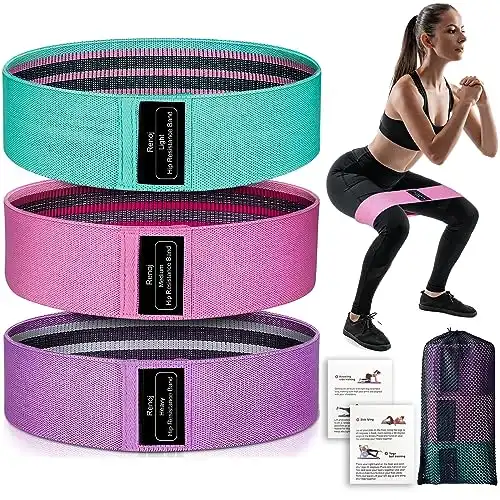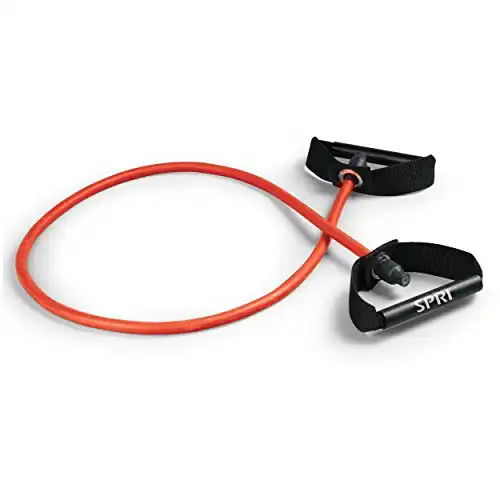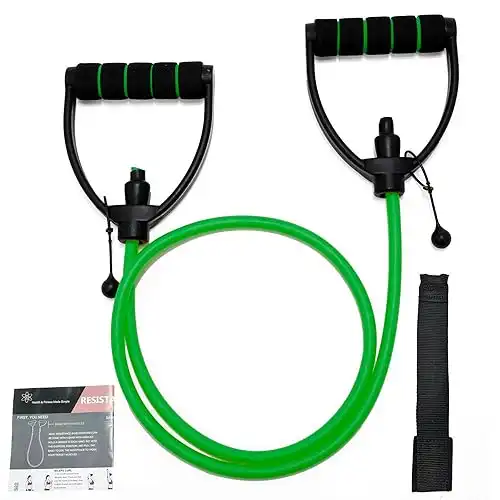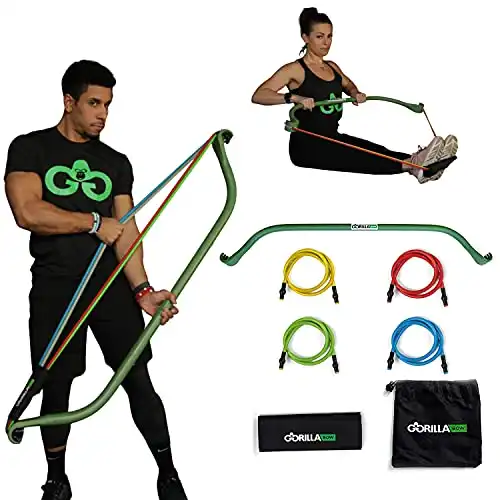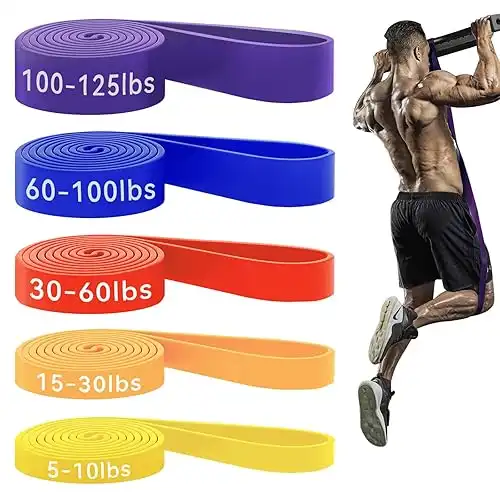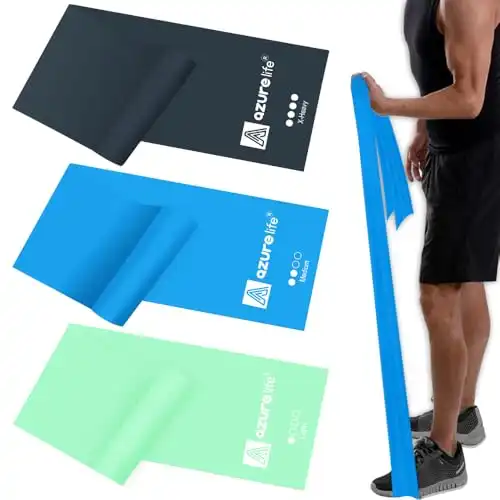This post contains affiliate links. Please see our disclosure policy.
Resistance bands are a simple but powerful strength training tool that can complement or replace dumbbells. Learn the benefits of resistance bands, how to incorporate them into your strength workouts, and which type of band to buy.
I have decades of experience as a personal trainer and women’s health expert, and I’m here to tell you that resistance bands are an amazing fitness tool. I’ve seen great results myself, and with clients too.
These simple, colorful bands can help transform your fitness game, whether you’re looking to enhance flexibility, build strength, or just add variety and a change of pace to your workouts.
Here’s a look at the top 10 benefits of using resistance bands in your workout routine, plus which ones I recommend buying!
1. Enhances Flexibility and Mobility
Resistance bands aren’t just for strength training; they’re fantastic tools for improving flexibility and mobility. Stretching with bands offers a deeper, more controlled stretch, making it easier to warm up or cool down effectively.
They help target hard-to-reach areas and can support functional movement, enhancing joint range of motion, which is crucial for daily activities and overall body balance.
I personally love using a long resistance band for shoulder mobility.
Hold the band, one end in each hand and pull with tension in front of your body. Then take your hands and arms up and back behind your body while pulling a little tension. And then go back to the front of your body.
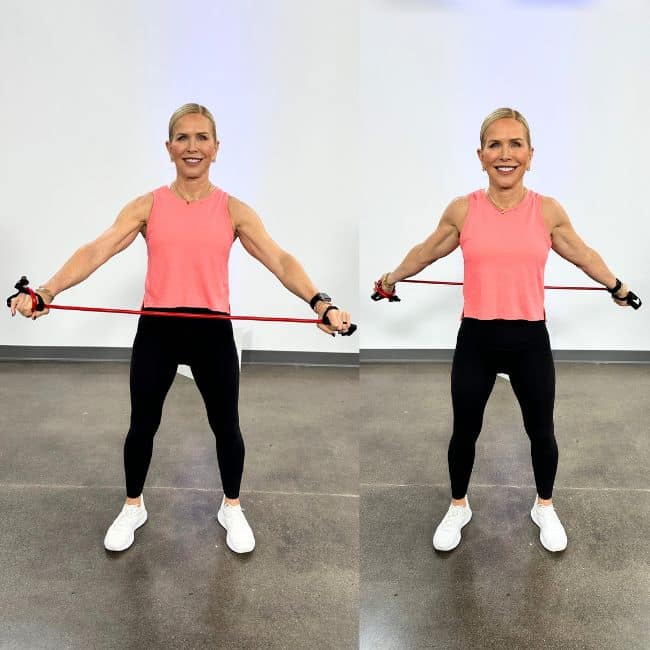
2. Boosts Strength Without Heavy Weights
Want to build muscle without lugging around heavy weights? Resistance bands provide a challenging workout that activates muscle fibers differently than free weights.
The constant tension bands provide as you push and pull works muscles throughout the entire range of motion, leading to strength gains without the need for a heavy set of dumbbells.
You’ll feel the burn as you work against the resistance, whether you’re performing squats, chest presses, or rows.
This resistance band squat is a great exercise to start with!
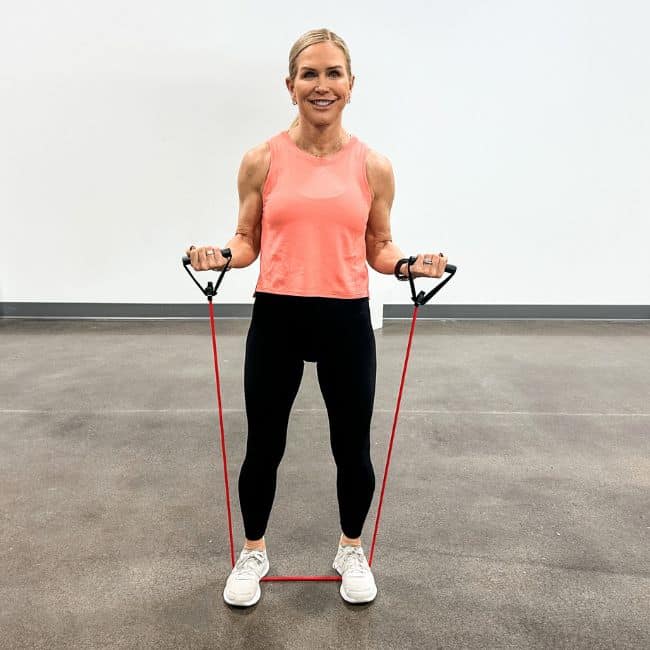
3. Activates the Core for Better Stability and Balance
Another benefit of resistance bands is that when using them for exercises like squats, lunges, and rows, you naturally engage the core, improving your stability and coordination.
These exercises demand control, which forces your core muscles to activate and stabilize your movements.
As a result, you’ll not only tone your abs but also enhance overall body balance, making you more resilient to injury in everyday movements.
This resistance band alternating glute squeeze exercise is a great exercise for focusing on your core and stability. I also recommend giving the resistance band row and the resistance band lunge move a try!
4. Perfect for Workouts On the Go
One of the greatest perks of resistance bands is their portability. Lightweight and easy to fold up, resistance bands fit perfectly in a suitcase or gym bag, making them ideal for travel.
You don’t need a gym to get a full-body workout; a set of resistance bands can offer a comprehensive routine anywhere—whether you’re in a hotel room, park, or even at the beach.
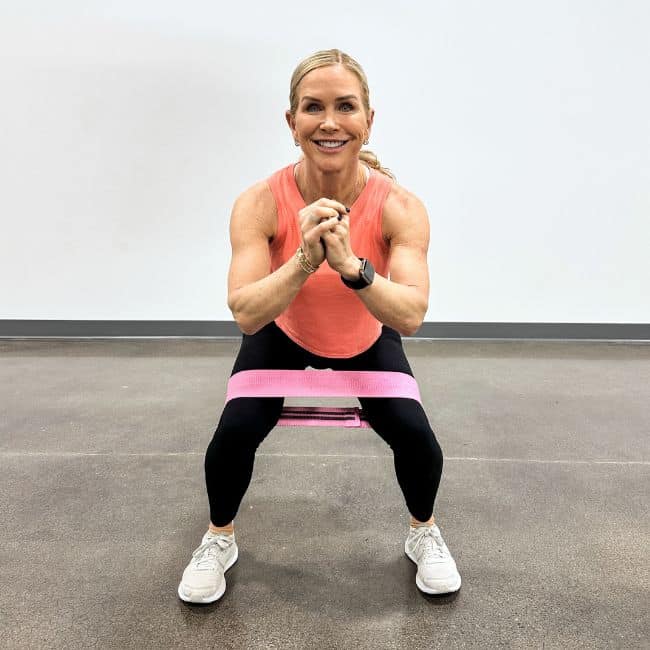
5. Improves Mental Focus and Brain Function
Research has shown that resistance training can help improve cognitive function, especially as we age. Using bands requires concentration, coordination, and awareness, which can sharpen the mind and strengthen the mind-muscle connection.
Keeping your brain engaged with movement can boost mental clarity and focus (and help to avoid pesky brain fog), making it beneficial not just for your body, but for your overall cognitive health too.
6. Cost-Effective For a Home Gym
Compared to a set of dumbbells or a gym membership, resistance bands are a budget-friendly option for adding resistance to your workouts. You don’t need a lot of gear or expensive equipment to make progress with your fitness goals.
For a small investment, resistance bands provide a versatile muscle building workout option that saves you money while helping you stay in shape.
7. Safer and More Compact than Weights
Another benefit of resistance bands are safer and easier to store than free weights, especially for those working out at home. There’s no risk of dropping a heavy dumbbell on your foot or knocking over equipment, which makes bands a practical option, particularly for beginners or those with limited space.
They’re also easier on your joints, providing a low-impact workout alternative to traditional weight lifting.
8. Supports Pull-Up Progression
If pull-ups are a goal, bands are an effective way to get there. By looping a band over the bar and under your knees or feet, you can get the assistance needed to work through pull-up motions.
Over time, as your muscles strengthen, you can move to lighter resistance bands until you’re able to perform a full pull-up unassisted. It’s a perfect tool for gradually building upper body strength.
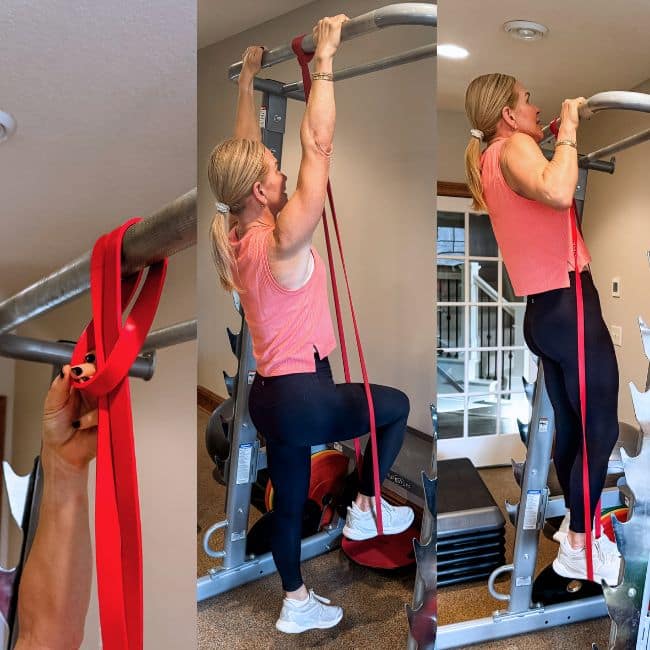
9. Ideal for Rehabilitation and Physical Therapy
Resistance bands are commonly used in physical therapy because they allow for controlled, low-impact movements that strengthen muscles without straining them. They’re gentle on muscles and joints, making them ideal for anyone recovering from injury, surgery, or dealing with chronic pain.
Whether it’s working on knee stability or shoulder mobility, bands can be customized for safe, gentle rehab exercises.
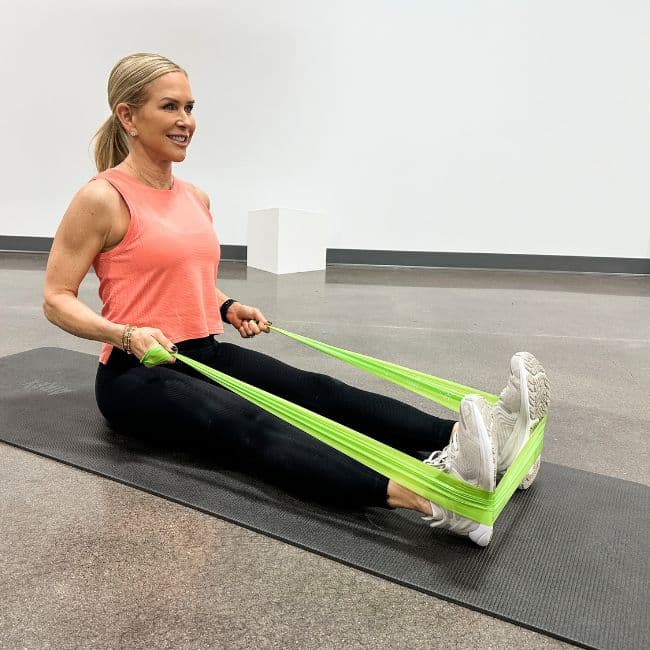
10. Adds Variety and Fun to Your Workout
Finally, one of the best parts about resistance bands is that they’re just fun to use! Adding bands to your routine can bring variety to your workouts, keeping them interesting and challenging.
From circuit training to Pilates-style movements, bands open up endless options, so you’re never bored and always finding new ways to move your body.
Check out these resistance band moves that tone the whole body for a free workout to get started with bands!
Getting Started with Resistance Bands
So, what exactly are resistance bands? Think of resistance bands as a bigger, sturdier version of a rubber band – only they’re designed to help you build strength, flexibility, and endurance!
These stretchy bands, usually made of latex or rubber, offer varying levels of resistance to make your exercises more challenging.
One benefits of resistance bands is that they are color-coded for easy selection of different levels of difficulty. Some are large loops, perfect for wrapping around your legs or securing to gym equipment, while others are tube-shaped and come with handles for a more controlled grip.
There are also kits that allow you to mix and match bands with different attachments, like handles or bars, so you can create a workout that’s tailored to your fitness level and goals.
Resistance Bands vs. Dumbbells
One thing to note is that you can’t compare a resistance band with a dumbbell. In other words, you can’t say a certain color band is equal to a certain size dumbbell. Physics dictates otherwise.
When lifting weights, gravity plays a big part. You get more resistance when lifting against gravity, but then gravity makes lowering the weight easier.
However, when using a rubber band, you do not fight gravity. Instead, the band is presenting you with resistance in both directions. The ability to move freely when using bands allows you to mimic and recreate everyday movements.
One of the main benefits is increasing and strengthening our natural movement patterns in daily activities such as a golf swing, throwing a football, lifting something up high, or even opening a door.
That being said, how do you choose the proper level of band for you? Pick a band that creates muscle fatigue after 15-20 repetitions. But also take into consideration you may use speed and pulsing to increase the intensity also.
At the end of the day, you may want a variety of colors based on which muscle group you are working.
Which Resistance Bands to Buy
Below, you’ll find a list of my favorite types and brands of resistance bands. Each recommendation is based on my experience using them myself and with clients.
Keep in mind, one of the benefits of resistance bands is that they come in various styles and strengths. It’s a good idea to have a few options on hand to match your workout needs.
- Best Loop Bands: Perfect for Barre, Pilates, and lower body exercises. I personally prefer fabric over rubber for more comfort on the legs.
- Best Bands with Handles: Ideal for full-body workouts, including upper body exercises. I use these in my workouts and live classes. This is the band I bring in my suitcase.
- Best Bands for Older Adults and Recovery: Lightweight options with padded handles, gentle on joints and muscles.
- Best for Home Gym Set-Up: Consider a complete set with a door attachment, like the Gorilla Bow Home Gym Resistance Training Kit.
- Best for Pull-Up Progression: A must-have for gradually building upper body strength. These bands look like a huge rubber band. See my photo above for an example on how to use it for assistance.
- Best for Therapy and Yoga/Pilates Classes: Flat bands without handles are designed for gentle stretching and rehab. These bands are perfect for lower-intensity workouts, for seniors who lack grip strength, and for Physical Therapy.
Who Should Use Resistance Bands?
If you’re curious about who can benefit from resistance bands, the answer is: just about everyone! These adaptable bands are suitable for a wide range of fitness levels and goals.
Here are some groups that can especially benefit:
Those Looking to Build Muscle
For anyone aiming to boost muscle size and strength, resistance bands offer a powerful alternative to dumbbells and weight machines. They deliver a unique challenge to your muscles, activating them in ways that can support growth and strength development.
Bands can even be added to traditional barbell exercises to increase intensity and improve neuromuscular response.
People Focused on Weight Loss
When combined with a balanced diet and regular cardio workouts, resistance bands can be an effective weight loss tool. Including them in a full-body circuit workout can help burn calories and build lean muscle simultaneously.
For instance, try a circuit with banded chest presses, squats, and back rows to elevate your heart rate and engage multiple muscle groups.
Older Adults
For those in their 60s and beyond, heavy weights might be too intense or risky. Resistance bands offer a safer alternative that still helps to preserve strength, maintain muscle, and even improve bone density.
Studies have shown that resistance bands are effective for enhancing strength and reducing osteoporosis risk, making them a top choice for seniors looking to stay active.
Athletes
Whether you’re a boxer, runner, or tennis player, resistance bands can help train your body for the dynamic, multi-directional movements that athletes need. Bands increase power, agility, and resilience, and they’re portable enough for on-the-go training.
They’re also fantastic for injury prevention, making them an athlete’s secret weapon.
Pregnant Women
During pregnancy, exercise is important for maintaining energy, mood, and overall health. Resistance bands offer a gentle, effective way to tone muscles without over stressing the body.
They can create a more attractive form of strength training, especially in the third trimester.
Ready to Give Resistance Bands a Try?
Resistance bands offer an accessible, versatile, and budget-friendly way to enhance your workouts. Whether you’re aiming to build strength, improve flexibility, or keep things fresh and fun, bands can fit right into any fitness level or goal.
Let me know if you are a fan already or if you are going to give bands a try!
| Product Image | Product Name | Primary Button |
|---|---|---|
